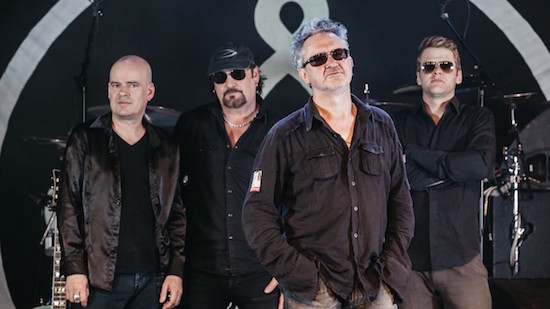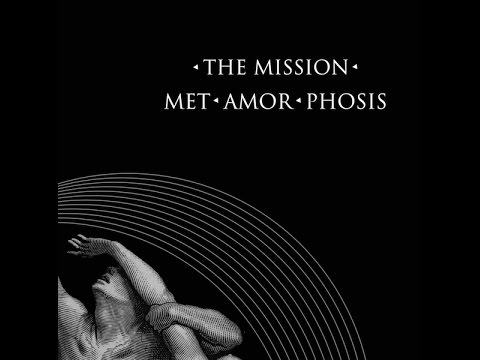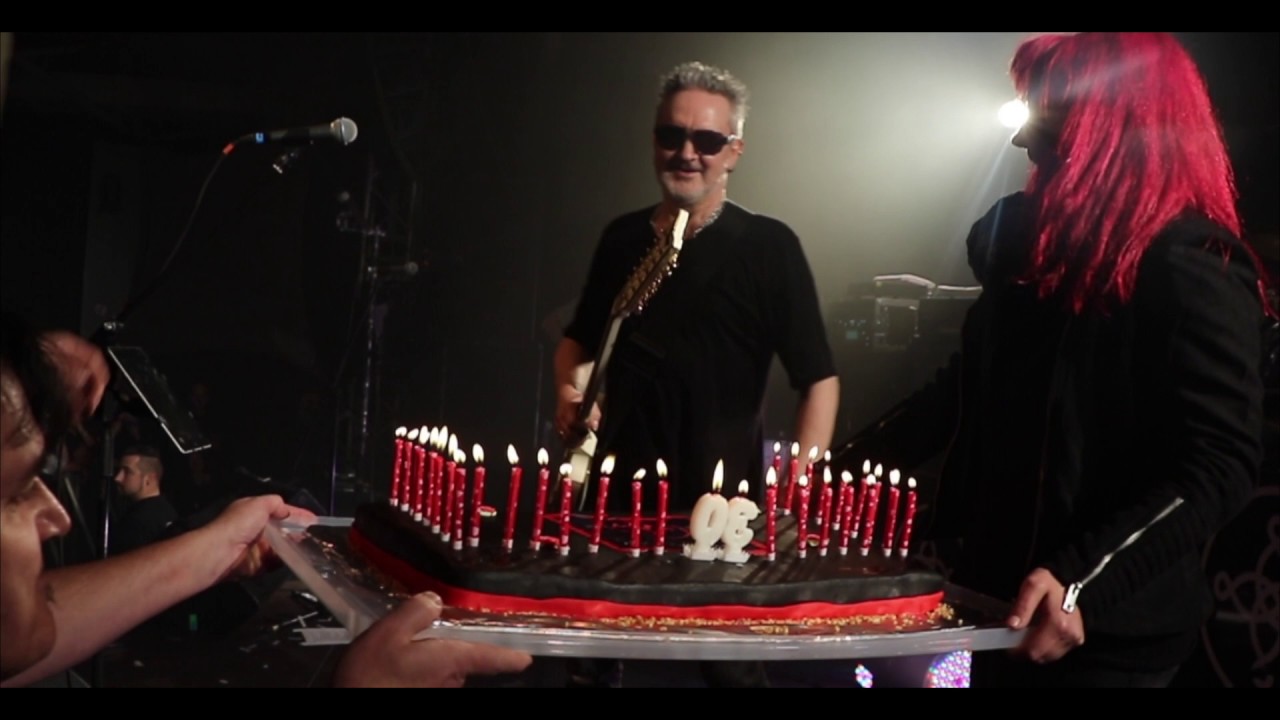Wayne Hussey, singer and guitarist in The Mission since their formation in 1986, is connecting with me via Skype from Bristol, the city in which he was raised, “where my folks still live” and where he’s just had dinner at his brother’s.
Hussey has lived in Brazil for 12 years with his wife Cinthya and has come to the UK to rehearse for The Mission’s upcoming Another Fall From Grace Tour. Just before that Hussey was in Madrid for El Clásico and "tourist stuff", he tells me, using the opportunity while in Europe also to catch up with friends in Lisbon and acquire a Russian visa in London.
We connected to talk about where The Mission find themselves in 2017, working with Billy Corgan and why his time with The Sisters Of Mercy has overshadowed much of his other work over the years, among a number of other subjects, ahead of a selection of live UK tour dates kicking off this week.
The Mission will play a trio of UK live shows across this month, taking in dates in Bournemouth, Oxford and Leicester. Scroll down for more details and the all-important ticket links.
So The Mission aren’t the sort of band that rendezvous at the first soundcheck and work it out from there?
Wayne Hussey: I wouldn’t be confident enough of our ability to do that. The last time we played was in November 2016 in New Zealand, so we’re spending four days rehearsing at Peter Gabriel’s place near Bath. I like to rehearse 30-40 songs. I don’t like to play the same set every night. I think the band would prefer the same 12 songs, to be honest, but if I get bored, then I think the audience gets bored too.
Personal relationships in The Mission have been tumultuous in the past, how are things now?
WH: True, Craig [Adams, bass] and I were estranged for a number of years. He left the group twice. Simon [Hinkler, guitar] left the group twice…
You’ve left the group twice…
WH: But not in the middle of a tour! I left to go off and do other things. In terms of the group, I’m definitely the boss. I wouldn’t say they were scared of me, but they listen to what I have to say.
Has that always been the group dynamic?
WH: I think it was always there to a degree, even from the very beginning. I wrote the tunes. I was the driving force. The rest of them were quite happy just to go along with things. But it was more of a democracy then.
We’ve got to the point now where we have a pretty good working dynamic. We’re not the best of friends; we only see each other when we work. But we do like each other and we recognise what’s good about each other, and about each other within the context of the band. Simon is the softest of the group, the easiest to hurt, which is not always a good thing. Craig is eccentric. I’ve known the guy 34 years. He’s not your typical kind of musician. Mike [Kelly, drums] is the most pragmatic and diplomatic.
What are your essentials on the backstage rider?
WH: Wine, basically. I have to drink wine before I go on stage. That is still part of the ritual, the ceremony. I usually go for a Cabernet or a Merlot. You’re at the mercy of promoters who try to cut corners, so you don’t always get the best wines in the world. But I look at the wine as being medicinal. It’s not there to be enjoyed, it’s part of my preparation for a show.
Recent photographic evidence shows you looking remarkably healthy for a man who’s 60 next year and caned it for quite a while. You obviously haven’t gone the full herbal tea, yoga and veganism route. So what’s the explanation?
WH: I had a good few years where I was a little wild and off the leash. I don’t really partake in drugs any more. I occasionally have a little dabble, very occasionally. I have no specific health routine. I’m vegetarian, my wife’s nearly 20 years younger than me, good luck, good genes, sunshine… I don’t know.
I saw the band at The Powerhouse in Birmingham in 1986, when you were still billed as The Sisterhood. Do you recall any of that show?
WH: We’d done the tour with The Cult in Europe and had come back to do three shows in the UK. Birmingham was one of those. Leeds got called off because of litigation from Eldritch. And I think we played the Electric Ballroom in London. I think it was the Birmingham show when I first felt like a frontman. I think it was the first time I put my guitar down and started rolling around the stage.
You didn’t plan on being the singer?
WH: I became the singer by default. I didn’t know if I could do it. We tried other people, but couldn’t find anyone we liked. We tried some local guys in Leeds; Craig knew a couple of people. Warners who were our label with The Sisters, they heard our initial batch of songs and didn’t think I could sing, so they gave us a list of about six people. Sal Solo from Classix Nouveaux, Peter Murphy, Gavin from The Virgin Prunes were on it.
You were in The Sisters of Mercy for less than two years and co-wrote only 6 or so songs, yet that band and those songs loom large over your reputation.
WH: I was in Dead Or Alive about the same length of time as The Sisters and if you look at Dead Or Alive’s catalogue, it’s probably the same amount of songs [I was involved in writing]. Yet my time in The Sisters is a shadow that’s been cast over everything I’ve done since. Some Sisters fans blame me for the split up which is totally wrong and will all be revealed in my book.
Your autobiography…
WH: I’ve done a deal and have until next October to write it. I’ve already started. I’m going to write a lot and get someone to edit the best bits. I’m not writing it chronologically. I’m on my fifth chapter. The first is about my audition for The Sisters and the first few months up to my first tour of America. I’m not sure all Sisters fans are going to like it because it blows the lid a little bit. There’s a Sisters forum called Heartland where I’m not even allowed to be mentioned by name.
Which of these Mission songs would make the best title for your autobiography: ‘Tyranny of Secrets,’ ‘Born Under a Good Sign,’ or ‘Sometimes The Brightest Light From The Darkest Place’?
WH: ‘Sometimes The Brightest Light From The Darkest Place’ appeals more to my sensibility in the telling of my life story. ‘Born Under A Good Sign’ would run it a close second. Tyranny – it just ain’t me.
What other rock autobiographies have you enjoyed?
WH: Just Kids by Patti Smith – absolutely brilliant, beautiful prose, a really great story too. And I’ve just finished the most hilarious rock autobiography I’ve ever read – Sick On You (by Andrew Matheson of The Hollywood Brats). So funny. Anyone who has ever been in a band can recognise themselves in that book.
What else is going to be in your book?
WH: The second chapter is about working with Pauline Murray but when I write things they go off at tangents, like working with Martin Hannett (on The Invisible Girls’ single ‘Searching For Heaven’). There’s another chapter about me and Craig going to work with Billy Corgan last year in Chicago. That goes off all over the place, about David Bowie, about Tom Verlaine and Television, about fame. I’m in the middle of writing about moving to Liverpool.
You were just playing Sisters songs with Billy Corgan?
WH: What we used as a basis was the audio from the Royal Albert Hall (Sisters show from June 1985). It was initially just a bit of fun. It was an idea Billy had. He invited me and Craig up to Chicago. We played together for four or five days, just the three of us and a drum machine. We thought, ‘Let’s take it out and play some shows with this.’ But for one reason or other it didn’t happen. Craig and I got busy with The Mission and Billy got busy with a solo album and it just kind of petered out.
The Mission are playing some shows this November with Alice Cooper.
WH: Here’s one example of democracy at work. I was the only one who voiced the opinion not to do those shows. I wasn’t sure to be honest, but everyone else really wanted to do them. I just don’t know what audience we’ll be playing to. I don’t know if it’ll do us any good.
Now we’re committed, I’m looking forward to it. Going on stage between The Tubes and Alice Cooper to an audience that largely doesn’t know us will be a challenge. I relish that idea. How can I say this without… when you go on stage and it’s your show, you don’t really have to work that hard to win that audience because you’ve already won them.
The Mission Information Service website quotes a cover of NME from December 1990: “The Mission – Britain’s Stupidest Band.” The cover also called the band “Czech Pint Charlies.” Such things obviously don’t rankle you?
WH: I remember at the time seeing that NME cover – it’s a picture of me and Craig in the main square in Prague – and thinking, “You bastards – you stitched us up again.” The press that Zeppelin or Floyd or these great bands got at the time, some of it was really derisive. I remember Freddie Mercury being on the cover of NME (in 1977): “Is This Man A Prat?” We used the British music press but they moved on to other things. That’s just the way it is.
When did you realise that the zeitgeist was slipping away from you?
WH: At Crewe railway station in about 1989, I saw two young girls with huge baggy jeans like the hippies in the ‘70s. They turned round and had Stone Roses T-shirts on. I felt there was a little bit of a change going on but that didn’t affect us. We still had an audience all around the world when we released Carved In Sand in 1990 but by ’92 with Masque, we made what was essentially a pop dance album at the time grunge was kicking off. We’d been a rock band for five, six, seven years and changed direction at the moment the whole fashion turned to rock. These are the decisions we make that lead us to where we are today.
You’ve always seemed OK with The Mission being described as a Goth band.
WH: I don’t really care, to be honest. I haven’t seen us as that for a long, long time, maybe the first album, at a stretch. Being called Goth is one of the least offensive things we’ve been called.
Especially, if you think of Goth as a post-punk continuation of Glam Rock and Psych?
WH: If you look at the music I was listening to in 1982/83, it would be 60s guitar bands, Psychedelic stuff, Glam Rock, certainly the more musical of the Punk stuff. You put all that into one pot and mush it up, maybe that is what you get – Goth.
The Mission play Bournemouth’s O2 Academy tonight (May 17), Oxford’s O2 Academy on May 18 and Leicester’s O2 Academy on May 27. For tickets, head here




